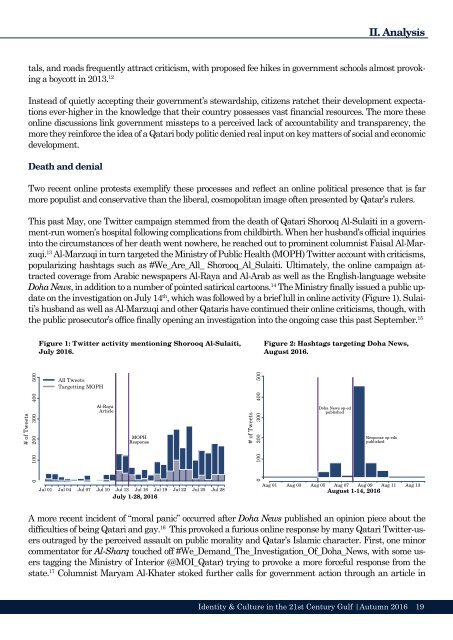You also want an ePaper? Increase the reach of your titles
YUMPU automatically turns print PDFs into web optimized ePapers that Google loves.
II. Analysis<br />
tals, and roads frequently attract criticism, with proposed fee hikes in government schools almost provoking<br />
a boycott in 2013. 12<br />
Instead of quietly accepting their government’s stewardship, citizens ratchet their development expectations<br />
ever-higher in the knowledge that their country possesses vast financial resources. The more these<br />
online discussions link government missteps to a perceived lack of accountability and transparency, the<br />
more they reinforce the idea of a Qatari body politic denied real input on key matters of social and economic<br />
development.<br />
Death and denial<br />
Two recent online protests exemplify these processes and reflect an online political presence that is far<br />
more populist and conservative than the liberal, cosmopolitan image often presented by Qatar’s rulers.<br />
This past May, one Twitter campaign stemmed from the death of Qatari Shorooq Al-Sulaiti in a government-run<br />
women’s hospital following complications from childbirth. When her husband’s official inquiries<br />
into the circumstances of her death went nowhere, he reached out to prominent columnist Faisal Al-Marzuqi.<br />
13 Al-Marzuqi in turn targeted the Ministry of Public Health (MOPH) Twitter account with criticisms,<br />
popularizing hashtags such as #We_Are_All_ Shorooq_Al_Sulaiti. Ultimately, the online campaign attracted<br />
coverage from Arabic newspapers Al-Raya and Al-Arab as well as the English-language website<br />
Doha News, in addition to a number of pointed satirical cartoons. 14 The Ministry finally issued a public update<br />
on the investigation on July 14 th , which was followed by a brief lull in online activity (Figure 1). Sulaiti’s<br />
husband as well as Al-Marzuqi and other Qataris have continued their online criticisms, though, with<br />
the public prosecutor’s office finally opening an investigation into the ongoing case this past September. 15<br />
Figure 1: Twitter activity mentioning Shorooq Al-Sulaiti,<br />
July 2016.<br />
Figure 2: Hashtags targeting Doha News,<br />
August 2016.<br />
# of Tweets<br />
0 100 200 300 400 500<br />
All Tweets<br />
Targetting MOPH<br />
Al-Raya<br />
Article<br />
MOPH<br />
Response<br />
Jul 01 Jul 04 Jul 07 Jul 10 Jul 13 Jul 16 Jul 19 Jul 22 Jul 25 Jul 28<br />
July 1-28, 2016<br />
# of Tweets<br />
0 100 200 300 400 500<br />
Doha News op-ed<br />
published<br />
Response op-eds<br />
published<br />
Aug 01 Aug 03 Aug 05 Aug 07 Aug 09 Aug 11 Aug 13<br />
August 1-14, 2016<br />
A more recent incident of “moral panic” occurred after Doha News published an opinion piece about the<br />
difficulties of being Qatari and gay. 16 This provoked a furious online response by many Qatari Twitter-users<br />
outraged by the perceived assault on public morality and Qatar’s Islamic character. First, one minor<br />
commentator for Al-Sharq touched off #We_Demand_The_Investigation_Of_Doha_News, with some users<br />
tagging the Ministry of Interior (@MOI_Qatar) trying to provoke a more forceful response from the<br />
state. 17 Columnist Maryam Al-Khater stoked further calls for government action through an article in<br />
<strong>Identity</strong> & <strong>Culture</strong> in the 21st Century Gulf |Autumn 2016 19


